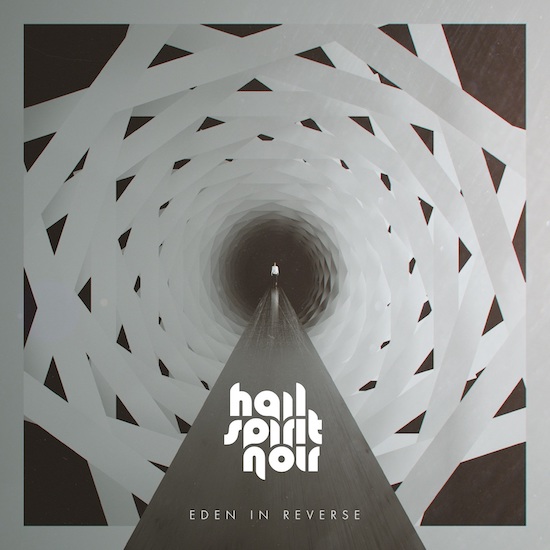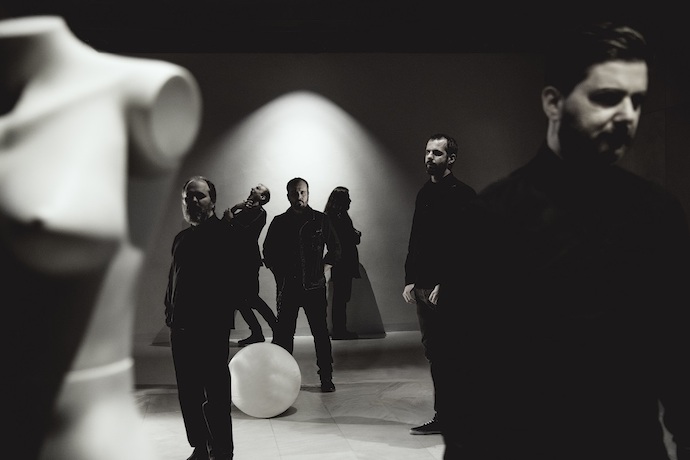
We are all well aware of beloved metal bands whose creative interests and impulses have led them to places very different from where they began. Sometimes, comparing starting and ending points can become jarring juxtapositions, even if directional signposts were evident along the way (at least for those who were paying attention). In other instances, change is more abrupt, perhaps the result of line-up revisions or of blatant commercial calculation.
Regardless of the explanation, change is risky, even when the results are superlative — and catastrophic when the outcomes are deplorable. But change is also the spice of life. It is also, in fact, the inherent underpinning of life. Without it, all of us would still be single-cell organisms swimming in salt seas. Because of it, we may someday swim among the stars.
Which brings us to Eden In Reverse, the brilliant new album by Hail Spirit Noir, and perhaps even an explanation of what the foregoing paragraphs have to do with the album.

Eden In Reverse represents change in more ways than one. It might go too far to say it’s a “concept album” in the commonly understood meaning of that term. But HSN have said that “in the lyrics, we re-wrote the story of Eden from a surreal, Richard Dawkins-esque, Darwinian point of view”. I could speculate about what that means. Why not?
In the Genesis myth the tale of Eden ended with Eve tasting the forbidden fruit of knowledge. To run that in reverse, from a Darwinian perspective, might be to consider that evolution has brought humankind to a point when its accumulation of knowledge has led to the questioning of God’s existence as never before, pointing to the conclusion that man created God rather than the reverse. And whether that’s a correct perception of what the band meant or not, other aspects of the record also seem to point to a futuristic potential — albeit a surreal imagining of where our continued evolving might lead us.
And of course that’s not surprising, because HSN’s music has always been surreal. Psychedelia has always been a sharp arrow in their quiver. But change has also always been endemic to their creativity, and so Eden In Reverse is different from Mayhem In Blue, just as that album differed from Oi Magoi and that one represented shifts from Pneuma. In this case it doesn’t seem that the changes were calculated — the band themselves have said that they “started off doing some experiments without any idea where they could lead to” and that “after the first 3-4 tracks, we realized we were onto something new for the band”: “We were no longer in the 60s-70s zone but more in the 70s-80s”.
That new zone in which the band found themselves is one in which analogue synths dating to the late ’70s and early ’80s play a prominent role. Throughout the album, that collage of richly layered but very strange tonalities, coupled with other keyboard manipulations, are fundamental to the music’s feeling of retro-futurism. In some ways, it could be thought of as a musical version of Fritz Lang‘s expressionist science fiction classic Metropolis. And perhaps consistent with the album’s lyrical themes, the music in the same way seems to use the technologies and progressive/psychedelic musical tropes of the past as a lense through which to see a far-flung future.
The synths also give the music that persistently surrealistic and hallucinatory atmosphere referred to above, but other ingredients pour into that effect as well, including the often subdued, languid, and seductive character of the singing. Sometimes the vocal patterns create rhythms of their own that mesh with the potent rhythms of the instruments (more on that in a moment), but they’re more often dreamlike and oracular in their feeling, though a number of the songs also include vocal harmonies that crest like waves.
But the music is not merely beguiling, bewildering, and mind-binding. These songs also include truly compelling rhythms, which are themselves richly varied and dynamic and often feature attention-grabbing interplay between the bassist and the drummer. At times, the drumming is riotous and blasting, but those are rare moments. For the most part, the variations are both mentally engrossing and powerfully head-moving. and used to good effect, along with heavy chords, to deliver body blows, and to magnify the music’s intensity and power.
The dynamism of the music is another signal feature of the album. The music has been meticulously constructed in almost every way imaginable, creating ebbing and flowing energy and volume, as well as mood alterations. The band incorporate experimental passages, perhaps most notably in the calamitous finale of “Alien Lip Reading”, the unnerving and abrasive intro to “Automata 1980”, and basically the entirety of the psychedelic melodic delirium that is “The Devil’s Blind Spot”. But they also provide the gift of “Crossroads”, which is simply glorious (and highly infectious), thanks in no small part to the magnificent guest vocals of Lars Nedland from Borknagar/Solefald. Even the ordering of the songs within the album was done in a way that creates dynamic and transfixing change.
And so, to repeat, change is the hallmark of the album in more ways than one. Fans who were enamored of the band’s unusual twists on black metal may miss the elements of black metal. They may wish for more metal in general; even though the music gets plenty heavy from time to time, its affinity for prog rock and psychedelia is more pronounced. But Eden In Reverse really doesn’t represent a radical alteration. It comes across, just as the band have stated, as a natural evolution, as the next progression of curious and creative minds. In retrospect at least, the signposts that led here were present before.
I’ll leave you with this thought. From the starting point to this current end-point (not really the end, of course, because who knows where Hail Spirit Noir will venture next), this band’s music has always been sinister and menacing, and it still is. The sense of tension and threat in “Incense Swirls” is unmistakable. The feeling of looming peril and fearful anticipation that lurks within “Alien Lip Reading” is also palpable (it crescendos in Cons Marg‘s screams near the end), and “The Devil’s Blind Spot” is simply deranged. “Crossroads” might make a magnificent radio track, but the rest of the album will challenge any sense of comfort you might have. And it also lights a blazing fire under the imagination, even if some of the visions it might spawn will leave you shivering.
For more insights into this fascinating album, check out our interview of HSN’s Haris and Theoharis which we published yesterday (here). The album will be released on June 19th by Agonia Records, and it’s available for preorder now.
EDEN IN REVERSE:
https://www.agoniarecords.com/hsn
HAIL SPIRIT NOIR:
https://www.facebook.com/Hail-Spirit-Noir-260062670728238
https://hailspiritnoir.bandcamp.com

I generally prefer my music abrasive and raw. For instance, I found Enslaved’s Riittiir and Axioma… a bit too proggy for my tastes and yet find myself really enjoying these 2 songs from HSN despite the lack of anything that could be called black metal. Perhaps it comes down to my preconceived notions about each band.
I’ll take the position that as much as I’ve tried to really dig into their past work, HSN’s albums just don’t do it for me. However, what I’ve heard from the new album makes me think that I might just finally be able to jump onto the HSN train. I think this is also an album that will sound killer on vinyl and I just might have to order me a copy.